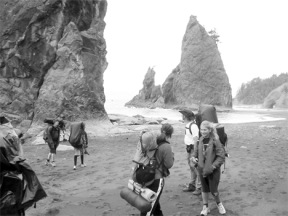Hiking single file on a narrow trail 1,000 feet above the pounding surf, gathering and cooking mussels over an open fire, learning to store food in “bear canisters,†searching for Indian artifacts.
For the Langley Middle School Adventure Education students, science, math, English and social studies jumped off the pages of text books during a three-day camp-out to the Washington coast. Their classroom literally came alive.
Instead of reading about the flora and fauna and history of the rugged coast, the group of 20 students experienced it.
In June, the students headed to the Washington coast with teacher Nels Bergquist and a number of chaperones.
During the 26-mile hike, they witnessed pounding surf, rugged islands and numerous rock formations on the coast. They explored a rainforest and discovered life in tidepools — and death on the sandy beaches in the form of a rotting harbor seal carcass. Students watched as eagles took turns devouring it.
Lainey Taylor, a seventh-grader, said she especially liked the “awesome views†of the coastline from the bluffs.
“The weather on this trip was definitely better,†said Taylor, who was on the Adventure Education trip to the Los Padres National Forest near Monterey, Calif., when the group was caught in a snowstorm in April. During that trip, a spring snowstorm caught students and chaperones by surprise and they spent a wet, cold night in the mountains.
Still, there were a few similarities.
“The level of hiking was the same as the California trip,†Taylor added.
Zeke Spalding said he was glad “we were able to finish this trip,†unlike the California camp out.
For Spalding, the most exciting part of the trip was finding whale bones and artifacts.
“We dug up whale bones on the beach. I found an artifact, probably an Indian necklace,†Spalding said.
The Adventure Education curriculum is set up to teach students self reliance, responsibility, teamwork, confidence and compassion, and to raise their environmental awareness. For many students Adventure Education offers their first real outdoor experience. It is also the first real challenge many have faced in their lives.
“It was a great trip. We really bonded as a group,†Taylor said.
The 14-year-old Langley Middle School Adventure Education program seeks to create outdoor experiences that will inspire a sense of wonder and joy in students that will form the foundation for future learning.
During this latest trip, the class was split in two groups. One group hiked north, and another group hiked south. The two groups met in the middle on day three of the adventure, then they continued in their respective directions.
During the trip the students gathered food from the beach, cooking the mussels they found along the way. “Many students were drawn to this hunter-gatherer lifestyle in the early stages of the coast hike. Some did not relinquish this way of living until they boarded the district bus and headed back to civilization,†Bergquist said.
At one point, Bergquist found an empty whisky bottle. It was decided that the group would send it out to sea with a message.
Taylor wrote a brief note, asking the finder to write back if the bottle was found. After that, the paper was passed from person to person. Students took turns writing several sentences to the finder of the bottle, then set the bottle aside for a ceremonial toss in the morning.
“We hope someone finds it and contacts us,†Taylor said.
Students hiked to the Chilean Memorial, a spot that was marked with a plaque indicating the spot where a ship had foundered. The group picked a flat spot on the beach, set up their tents and started a campfire. Students filled their water bottles from a nearby stream.
“The dead, putrid sea lion was encountered while rounding Johnson Point. The smell of the beast resulted in a quick retreat from the carcass,†Bergquist said. “Hiking around Johnson Point was slow going because of its rocky nature.â€
The group ended their adventure on the three-mile boardwalk trail through the Olympic rainforest.
“This was an outstanding way to end the trip, in old growth trees and open meadows,†Bergquist said.
After three days in the wilderness, the students were ready for civilization. After the bus picked up both groups, they headed for Port Angeles.
“The dreamlike spell of the coast was broken by the beep of the registers at McDonald’s,†Bergquist added.
Read more about the trip on the class blog www.lmsadventure.blogspot.com.
Adventure Education began in 1992, when the first class, a handful of eighth-graders, boarded a sailing ship for a two-hour cruise around Langley Harbor. The students’ ride aboard the well-known Whidbey Island schooner Cutty Sark was the seed for Adventure Education classes at LMS.



